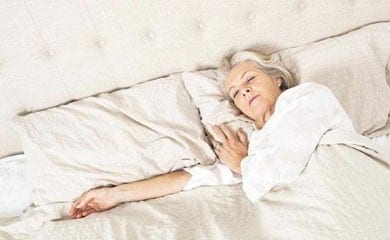
Older Australians are drinking so much coffee and booze that it’s damaging their already fragile sleep, a new survey has found.
A survey of sleep patterns and habits by Sleep Health Foundation has revealed consumption of caffeine and alcohol increases steadily with age. As a result, people aged over 55 are waking an average of 2.5 times each night, disruptions that affect sleep quality.
The findings are concerning given older people naturally have a more disturbed sleep, a known developmental change linked to ageing, says Professor David Hillman, president of the Sleep Health Foundation, Australia’s leading national advocate for sleep health.
“It seems that older people are not doing themselves any favours drinking lots of alcohol and coffee, mood-altering substances which have been proven to be detrimental to a good night’s sleep,” Professor Hillman says. “As they age, people should really be consuming less of these, not more.”
Dr Hillman issued the warning ahead of the daylight saving change this Sunday, October 4, which will see people living in New South Wales, Victoria, South Australia, Tasmania, and the Australian Capital Territory put their clocks forward one hour at 2am.
The so-called ‘Spring forward’ clock change robs people of an hour’s sleep that night but studies show the impact of this seemingly small one-hour shift in the sleep cycle can affect sleep for up to a week.
“We’re concerned this change can take an even tougher toll on older people who are already dealing with heavily disrupted sleeps,” Dr Hillman says.
The online survey of 1050 people, including 730 women, found that Australians are getting 7 hours 18 minutes sleep a night on average, on the lower end of the foundation’s recommended healthy range.
Those aged over 55 got slightly less, 6 hours, 50 minutes a night, and admitted to waking 2.5 times a night on average, mostly to go to the toilet, or due to a busy mind, body aches or partner disturbance. Ninety per cent drank coffee, 52 per cent drank alcohol, 15 per cent had sleeping tablets, all figures that were lower among young and middle-aged people. They also reported consuming larger quantities of caffeine than other age groups.
“Our advice is if you’re struggling with your sleep, and you’ve got a bit of coffee and alcohol in your diet, experiment with having less. You could be very pleasantly surprised to find yourself sleeping better,” says Dr Hillman, an experienced respiratory and sleep medicine physician.
He also has advice around the clock change to help all Australians make the move into daylight savings more smoothly. “If you can, get into the habit of hitting the hay about the same time each night,” Dr Hillman says. “It will take the unpredictability out of bedtime and train your brain to know when to start preparing for sleep, making the daylight saving clock change a much easier adjustment for your body.”
The foundation has a string of other hints to make Sunday’s ‘spring forward’ easier to cope with.
- Go to bed 15-20 minutes earlier for a few days before putting clocks forward
- Set the alarm to wake up 30 minutes earlier than you normally would on the weekend, especially on Sunday morning, in preparation for the early start on Monday
- Make the bedroom as bright as possible when you first wake up in the morning
- Eat a good breakfast
- Go outside in the sunlight in the early mornings
- Exercise outside in the mornings
- Try to get between seven and nine hours sleep each night
- Don’t exercise just before going to bed
- Don’t drink coffee, tea or other caffeine drinks in the evening, avoid smoking just before bed or during the night
- Be aware that alcohol in the evening is likely to affect your sleep, especially in the second half of the night, when it may become more fragmented
- Don’t go to bed hungry or too soon after eating a large meal
TIME TO WIND FORWARD
Australian Daylight Saving began on Sunday, 4 October 2015, at 2am when clocks were turned forward 1 hour to 3am local daylight time.
Sunrise and sunset was about 1 hour later on 4 Oct 2015 than the day before. There will be more light in the evenings from now on.
In Australia, daylight saving is observed in NSW, Victoria, South Australia, Tasmania and ACT. Daylight saving is not observed in Queensland, Northern Territory or Western Australia.


